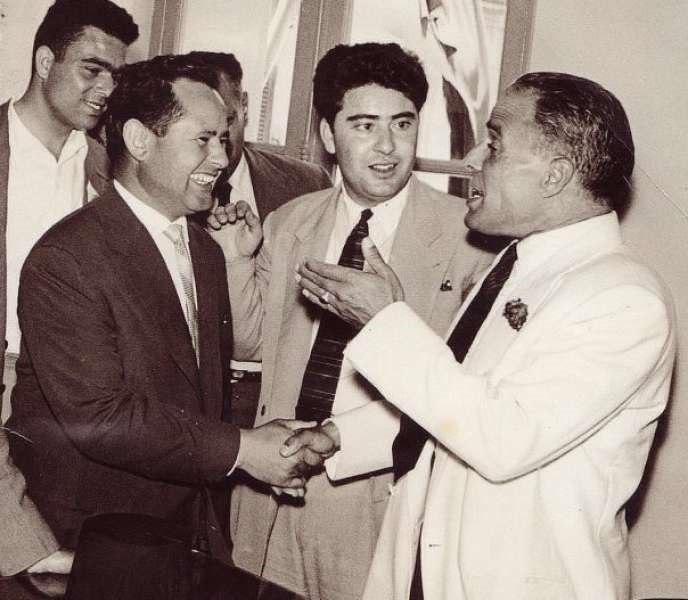He was in control of the economy from 1961 to 1969, before falling into disgrace and being sentenced to hard labor. He died on September 16 in Tunis, at the age of 94.
The man who, in the 1960s, controlled the Tunisian economy, with the unconditional support of President Habib Bourguiba (1903-2000), made so much of it that his mentor took umbrage. He threw him in jail, ending overnight a decade of planning dirigisme that the country was tired of. Ahmed Ben Salah, an incorruptible doctrinaire, one of the few ministers of Bourguiba with the makings of a statesman, did not deserve this disgrace.
But, deaf to criticism, he had gone too far too fast, forcing, in the name of efficiency, small landowners to group together in state-controlled cooperatives. Yet his intentions were pure, and his will to pull his country out of misery was the fight of his life, following in the footsteps of his father, a nationalist persecuted by the authorities of the French protectorate.
He died in Tunis on Wednesday, September 16, at the age of 94. He was born on January 13, 1926 in Moknine, a town on the east coast. He did his secondary studies at the Sadiki College in Tunis, the nursery of the future Tunisian elite. In Paris, where he undertook a degree in Arabic language, he was general secretary of the Bourguiba party in France.
An utopian
He taught for a time in Sousse but he was, at an early age, an aircraftman whose career took off when Tunisia gained its independence in 1956: general secretary of the single union, the Tunisian General Labor Union (UGTT), first vice-president of the Constituent Assembly?
Bourguiba falls under the influence, if not the control, of his quarter-century younger brother, whose impetuosity and inexhaustible rhetoric remind him of his youth. He gives his green light to the development plan of the country that this one submits to him. Has he sufficiently measured the risks? Bourguiba has no economic background, he is a politician. The deficiencies and assets of his protégé are the same, but unlike Bourguiba, who knows how to be pragmatic, Ben Salah is a utopian.
This plan owes a lot to a French Third World economist based in Tunis, Gérard Destanne de Bernis, who will later have his share of responsibility in the risky economic choices of independent Algeria. Bernis is of the opinion that Tunisia should be rid of its “conservative and liberal forces” and that production should be oriented towards a cooperative system closely controlled by the State.
Ben Salah: “Super-minister”
At the age of 35, in 1961, with this roadmap before his eyes, Ben Salah took control of the country’s economy, 44% of which depended on agriculture. As the months went by, his ministerial responsibilities expanded to include planning and economics, finance, trade, industry, agriculture, and national education. Bourguiba defended tooth and nail his “superminister” who was responsible for giving substance to the new presidential doctrine: “Destourian socialism,” which rejected class struggle and advocated national unity.
The “Ben Salah years (1961-1969) have not been negative for Tunisia: ex nihilo creation of a tourist sector, embryo of industrialization, oil research, land irrigation … But these results have not compensated for poor harvests due to the drought that so often hits the country.
Ben Salah sealed his fate on the day when, believing himself to be invulnerable, he wanted to rationalize the management of large agricultural estates. The anger of the owners was added to the anger of the small peasantry, which was already very much attached to its plot of land and its rare olive trees.
Prison, exile and grace
Bourguiba, ill, disoriented by the rise in discontent, disappointed by Ben Salah’s record, had him brought to justice. In 1970, a court created from scratch sentenced him to ten years of forced labor for “high treason,” an incrimination that included “knowingly misleading the head of state.
After three years in a cell, Ben Salah escapes, hiding his features under a woman’s veil in the back of a car. He crosses the Algerian border on foot and takes refuge in Europe. He fears for his life: in 1961, Bourguiba had his great rival of the 1950s, Salah Ben Youssef, assassinated in Frankfurt.
When Bourguiba is ousted from power, President Ben Ali pardons Ben Salah, who returns to the country in 1988. He made him pay back his pension arrears in cash, but placed him on a wiretap and banned him from any political activity.
Source: Le MONDE































